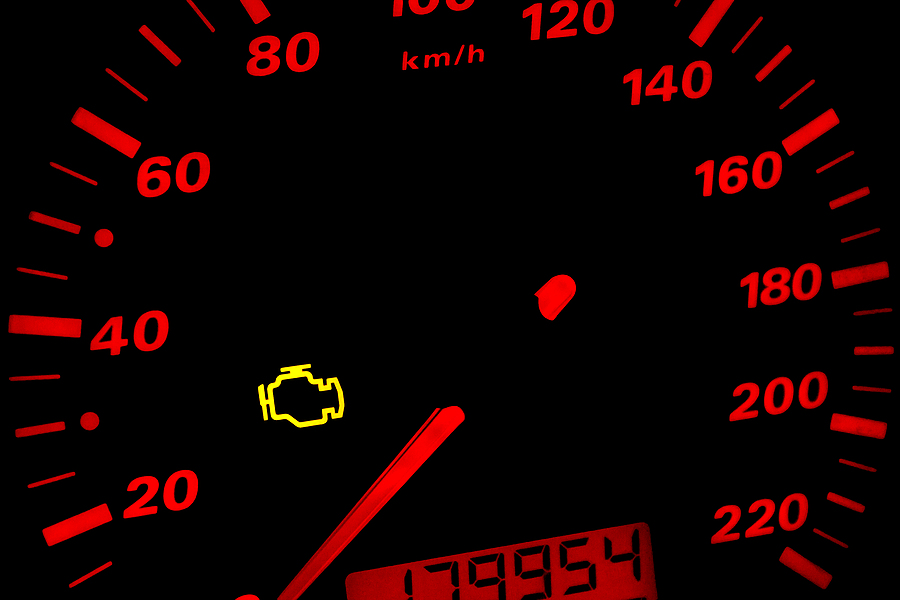You’re cruising along the highway, your favorite tunes blasting, when suddenly, an ominous glow catches your eye—your car’s check engine light is on. Also known as the malfunction indicator lamp (MIL), this warning light is an undeniable source of anxiety for many drivers. Just how serious is a check engine light? Can you continue your journey, or should you pull over right away? The answer is not always straightforward.
In this blog post, we will delve into the common causes behind a check engine light, explore the severity of these issues, and provide a practical guide on what to do (and not to do) when faced with this automotive conundrum. Buckle up and join us for this informative ride!

Why is My Check Engine Light On?
First things first, let’s talk about what triggers the check engine light. Contrary to popular belief, it doesn’t simply turn on when your car needs an oil change. In fact, a check engine light can indicate a wide variety of issues, ranging from minor to severe. Some common causes include:
Loose or faulty gas cap: Believe it or not, a loose or faulty gas cap can trigger the check engine light. This is because it affects the fuel system’s pressure and can cause fuel vapors to escape.
Oxygen sensor failure: The oxygen sensor measures the amount of unburned oxygen in your car’s exhaust system. A failing sensor can lead to reduced fuel economy and higher emissions.
Spark plug malfunction: Spark plugs play a vital role in starting your car’s engine. When they fail, it can cause issues with acceleration and fuel efficiency.
Catalytic converter failure: The catalytic converter helps reduce harmful emissions from your car’s exhaust. If the catalytic converter fails, you may notice a decrease in performance and an increase in emissions.
Mass airflow sensor malfunction: This sensor measures the amount of air entering your car’s engine and helps determine how much fuel is needed. A faulty sensor can lead to poor performance and reduced fuel efficiency.
Battery or alternator issues: Your car’s battery and alternator work together to power electrical components in your vehicle. If either one malfunctions, it can trigger the check engine light.
These are just some of the common causes behind a malfunction indicator lamp. Keep in mind that there are countless others, and it’s best to have a mechanic diagnose the issue to pinpoint the exact cause.
So How Serious is My Check Engine Light?
Now let’s get to the question on everyone’s mind: how serious is a check engine light? The answer depends on the root cause of the issue. Some problems may be minor and not affect your car’s performance, while others can lead to serious damage if left unaddressed. Generally, it’s best to have the issue addressed as soon as possible to avoid any potential future complications.
What Should I Do When My Check Engine Light Comes On?
As tempting as it may be to ignore the check engine light and hope it goes away, that’s not a smart move. Here are some dos and don’ts to follow when the dreaded warning light comes on:
Do…
Check your gas cap: If it’s loose, tighten it. If it appears damaged, replace it.
Assess the situation: Take note of any changes in your car’s performance or any unusual sounds or smells. This information can help a mechanic diagnose the issue.
Check your owner’s manual: It may provide some insight into potential causes of the check engine light and recommend actions to take.
Get it checked by a professional: While the above steps can be helpful, it’s best to have a trained mechanic diagnose and fix the issue.
Don’t…
Panic: A check engine light is not an immediate cause for alarm. As mentioned earlier, it can indicate minor issues as well.
Ignore the light: Ignoring the problem will only lead to potential complications and costly repairs down the road.
In Conclusion
The check engine light may be a source of anxiety for many drivers, but it’s not something to be taken lightly. While it can indicate a wide range of problems, it’s best to have the issue addressed as soon as possible to avoid any potential future complications. Remember to be proactive and follow our guide on what to do (and not to do) when faced with this automotive conundrum.
Can’t afford to repair your check-engine-light problem? Perhaps it just isn’t worth it to repair your vehicle because it is valued so low on the market? Just contact GC’s Junk Cars at 513-991-4776 and get paid cash on the spot by our Cincinnati OH junk car buyers! We accept all make and model vehicles, regardless of condition. We also provide free junk car removal!
Related Posts:
What to Do if You Cannot Pay $5000 to Replace a Blown Car Engine
5 Things You Should Never Do if You Want to Be a Good Car Owner
Keep an Eye Out for These 3 Common Auto Repair Shop Scams
